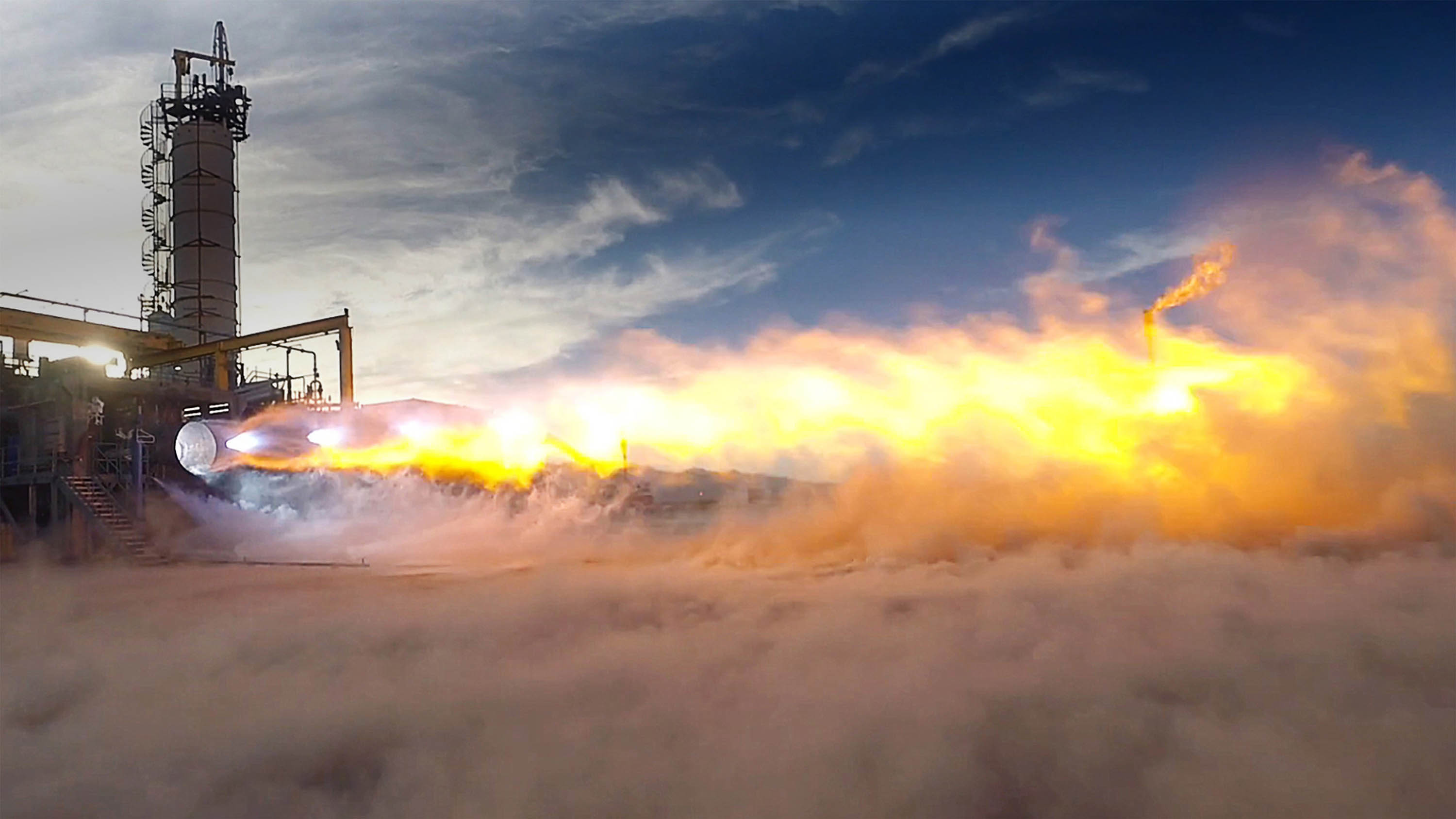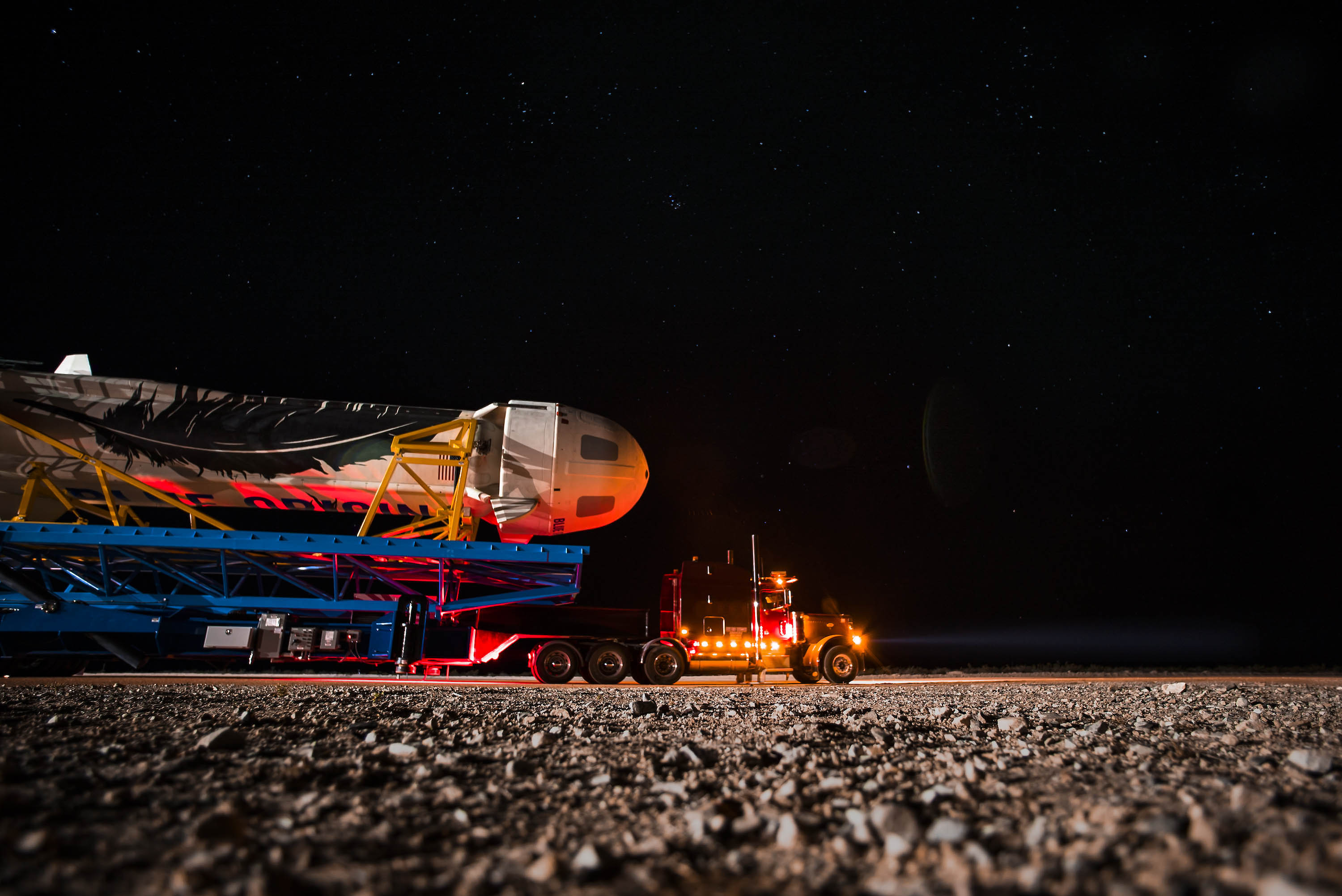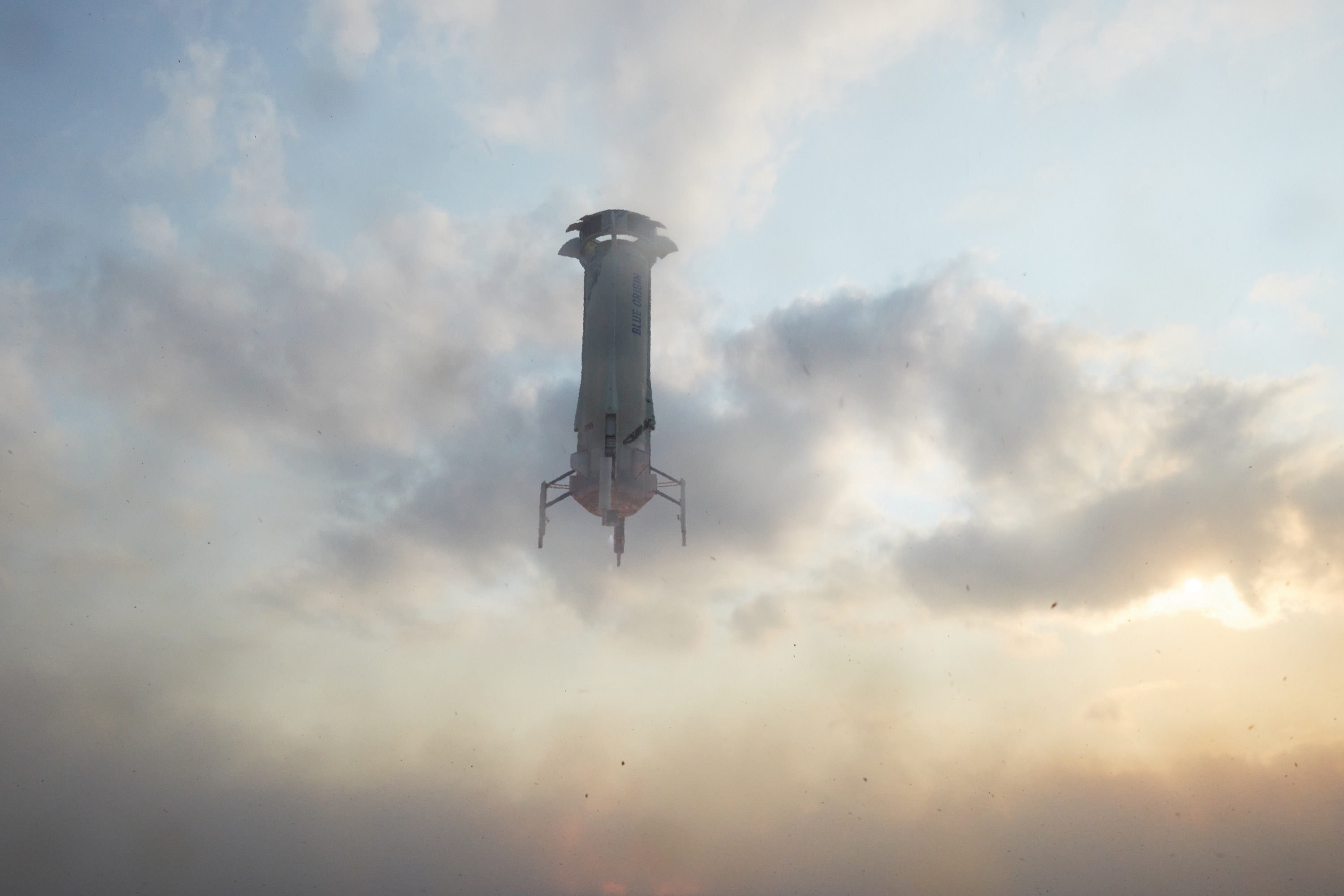Jeff Bezos' Blue Origin faces scathing criticism of safety and culture

With Blue Origin's second crewed flight less than two weeks away, the company is facing scathing allegations about its culture and the safety of its suborbital launch system, New Shepard.
The Federal Aviation Administration (FAA) is now considering concerns related to vehicle safety that were raised in a detailed essay published by the Lioness on Thursday (Sept. 30). In the essay, 21 past and current Blue Origin employees, all but one of them remaining anonymous, raise a string of concerns about the company's culture, including allegations of sexism, corporate suppression of dissent, disdain for sustainability and a habit of prioritizing schedules above safety when it comes to New Shepard.
"The FAA takes every safety allegation seriously, and the agency is reviewing the information," an agency spokesperson told Space.com in an email.
In photos: Blue Origin's 1st New Shepard passenger launch with Jeff Bezos
The allegations come about two months after Blue Origin's founder, Amazon's Jeff Bezos, rode his company's suborbital launch system on an exultant 10-minute long flight, the vehicle's first ever crewed mission — and just days after the company announced that its next crewed mission would launch on Oct. 12.
At the time, the company also identified two of the four passengers on the Oct. 12 flight: Chris Boshuizen, a co-founder of Earth-observation company Planet, and Glen de Vries, who is vice chair for life sciences and healthcare at a French software company. De Vries told The New York Times that he was not concerned about safety on the upcoming flight.
"I am confident in Blue Origin's safety program, spacecraft, and track record, and certainly wouldn't be flying with them if I wasn't," he told The New York Times. "I've been to the launch site, met people at every level of the company, and everything I've seen was indicative of a great team and culture."
Get the Space.com Newsletter
Breaking space news, the latest updates on rocket launches, skywatching events and more!
In a statement, the company rejected the allegations aired in the Lioness piece. "Blue Origin has no tolerance for discrimination or harassment of any kind," a company spokesperson told Space.com by email. "We provide numerous avenues for employees, including a 24/7 anonymous hotline, and will promptly investigate any new claims of misconduct. We stand by our safety record and believe that New Shepard is the safest space vehicle ever designed or built."
New Shepard, a reusable rocket-capsule combo, has flown 17 times without incident.

In an email to employees obtained by CNBC, CEO Bob Smith wrote to "reassure" workers. "First, the New Shepard team went through a methodical and pain-staking process to certify our vehicle for First Human Flight. Anyone that claims otherwise is uninformed and simply incorrect," he wrote, according to CNBC. "It should also be emphatically stated that we have no tolerance for discrimination or harassment of any kind."
The essay, which reads as a scathing indictment of the company's culture, marks the second publication by Lioness, a company that bills itself as a "storytelling platform" and also works to arrange media coverage of its features. Only one of the 21 signatories is named publicly: Alexandra Abrams, who worked in Blue Origin's communications department from June 2017 to November 2019, according to her LinkedIn profile.
In the statement, the Blue Origin spokesperson wrote, "Ms. Abrams was dismissed for cause two years ago after repeated warnings for issues involving federal export control regulations"; Abrams has said that she was told leadership no longer trusted her.
In an interview with CBS Mornings, Abrams offered a little more detail about the group behind the essay, noting that 13 of the 21 people are or were "engineers or technical" personnel. "They span all the major programs of the company, and they also span different levels," Abrams said. Later in the interview, she noted that the group "includ[es] very senior people."
Blue Origin has been lucky that nothing has happened so far.
-- former Blue Origin employees
The essay touches on a range of issues, but the authors highlighted safety as their motivation, calling it "for many of us ... the driving force for coming forward with this essay." The essay paints a portrait of a corporate culture that devalues safety concerns and risk management.
"Some of us felt that with the resources and staff available, leadership’s race to launch at such a breakneck speed was seriously compromising flight safety," the authors wrote, comparing the situation to the environment at NASA discovered after the 1986 explosion of the space shuttle Challenger 73 seconds after launch.
"Concerns related to flying New Shepard were consistently shut down, and women were demeaned for raising them," the authors wrote. "In the opinion of an engineer who has signed on to this essay, 'Blue Origin has been lucky that nothing has happened so far.' Many of this essay's authors say they would not fly on a Blue Origin vehicle."
The letter is sparse on specific allegations, but three items stand out as relatively detailed concerns.
One is a reference to a backlog of more than 1,000 unaddressed "problem reports" in 2018 regarding "the engines that power Blue Origin's rockets." The engine in question is likely the company's BE-3, which uses a mix of liquid oxygen and liquid hydrogen and made its first flight in 2015, according to the company's website. According to the website, the company is still testing a new model of BE-3 for use on its planned orbital vehicle, New Glenn. (Other engines Blue Origin is building include the much-delayed BE-4, which is in testing and slated for use on New Glenn and United Launch Alliance's Vulcan, and the BE-7, which is also still in development.)

In addition to the engine problem reports, the essay writers also pointed to insufficient staffing on an unspecified aspect of New Shepard. "In 2019, the team assigned to operate and maintain one of New Shepard's subsystems included only a few engineers working long hours," they wrote. "Their responsibilities, in some of our opinions, went far beyond what would be manageable for a team double the size, ranging from investigating the root cause of failures to conducting regular preventative maintenance on the rocket's systems."
And the essay writers also noted steps taken out of order in New Shepard's development. "Internally, many of us did not see leadership invest in prioritizing sound systems engineering practices," they wrote. "Systems engineering products were created for New Shepard after it was built and flying, rather than in the design phase; this impacted verification efforts."
Abrams told CBS Mornings that, while she was employed at Blue Origin, she approached management about safety concerns reported by technical staff and was rebuffed. "Oftentimes, when I would try to reconcile what I was hearing from the engineers who were close to the vehicle versus leadership about risk and safety, I would often go to leadership and say, 'OK, how am I supposed to think about this?'" Abrams said. "Often the response would be, 'Oh, well, that person in particular doesn't have a high enough risk tolerance.'"
According to the interview, the co-authors sent the essay to the FAA before publication in order to flag the safety concerns.
Schedule and spending over safety
The essay and Abrams' interview with CBS both connect the downplaying of risks with the company's broader culture. "You cannot create a culture of safety and a culture of fear at the same time. They are incompatible," Abrams said.
In the opinion of Abrams and her co-authors, the company's blasé safety philosophy developed primarily in response to the "billionaire space race" idea that developed between three rival private space companies: Bezos' Blue Origin, Elon Musk's SpaceX and Richard Branson's Virgin Galactic.
Abrams told CBS Mornings that the company's atmosphere was pleasant when she first joined, but it quickly soured. "It was great that Blue Origin was smooth and steady and slow — until Jeff [Bezos] started becoming impatient and Elon [Musk] and Branson were getting ahead," Abrams said. "Then we started to feel this increasing pressure and impatience that would definitely filter down from leadership."
When asked, Abrams agreed that, at the time, competition seemed to take precedence over safety in guiding Blue Origin's decisions.
The essay also ties safety lapses to competition and Bezos' personal priorities. "At Blue Origin, a common question during high-level meetings was, 'When will Elon or Branson fly?,'" the authors wrote. "Competing with other billionaires — and 'making progress for Jeff' — seemed to take precedence over safety concerns that would have slowed down the schedule."
(Bezos' rivalry with Musk may be especially intense, as the two billionaires have traded barbs repeatedly over the years.)

But the group notes other factors that they see as contributing to the deprioritization of safety as well.
They wrote of a budget-conscious culture and an emphasis on slim spending even when projects were made more ambitious. "Employees are often told to 'be careful with Jeff's money,' to 'not ask for more,' and to 'be grateful,'" they wrote. And both the essay and Abrams' remarks point to increasingly aggressive contract terms for employees, including pressuring existing employees to sign non-disclosure agreements.
The group also described diversity shortcomings and "a particular brand of sexism," including at high levels of the company despite its idealistic goals. "The workforce dedicated to establishing this future 'for all' is mostly male and overwhelmingly white," they wrote. "One-hundred percent of the senior technical and program leaders are men." They describe sexist remarks from two unnamed senior figures and leadership's "clear bias against women," manifested in situations like the treatment of departing employees.
The essay also accuses the company of dismissing environmental concerns and Bezos of acting counter to his public donations to environmental causes.
In general, the essay targets company leadership as a whole and the culture that leadership has created, with no specific allegations against Bezos, although Abrams mentioned him specifically in the CBS Mornings interview.
"I think I would say to Jeff that I really wish he was the person we all thought he was and that Blue Origin was the company we all thought it was going to be," she said.
Blue Origin's publicity blues
The essay marks another publicity blow for Blue Origin, which appears to be deep into bickering with its rival billionaire-founded space companies.
The company is sparring with SpaceX over a hotly desired contract for NASA's Human Landing System (HLS), the component designed to ferry astronauts from lunar orbit to the moon's surface, perhaps as early as 2024.
NASA officials had previously said that they would like to select more than one concept for HLS funding. But in April 2021, after receiving much less funding for the project from Congress than the agency had requested, NASA decided to fund development work only from SpaceX, which had submitted a cheaper bid than the Blue Origin-led "National Team" or the third entrant in the competition, Dynetics. Blue Origin responded by filing a protest with the agency's internal Office of Inspector General (as Dynetics did as well). When that tactic failed, Blue Origin decided to sue NASA.
As a result, the agency and SpaceX cannot work on HLS until November. All told, the objections will mean minimal work completed even six months after the contract's announcement. Meanwhile, in July, Bezos penned an open letter to NASA Administrator Bill Nelson offering to cover some costs of a Blue Origin HLS program in-house and raising a host of complaints about the process behind the contract.
The company even raised eyebrows around its greatest success to date, Bezos' own flight. After Branson announced that he would fly on Virgin Galactic's suborbital tourism system just over a week before Bezos' announced flight date, Blue Origin dug into a bitter publicity push comparing the two flight systems.

Such efforts perhaps didn't come as much of a surprise to the Lioness essay authors.
"Billionaires may like to present themselves as altruistic, using their resources for the benefit of humanity; in our opinion, however, much of that image is an illusion created by public relations teams, underpinned by ego," the authors wrote.
The essay authors note that they're happy to have billionaires fund space exploration. But they argue that it's important to consider the wider implications that an environment like the one they claim Bezos has fostered has for the space community.
"In our experience, Blue Origin’s culture sits on a foundation that ignores the plight of our planet, turns a blind eye to sexism, is not sufficiently attuned to safety concerns, and silences those who seek to correct wrongs," the essay reads. "That's not the world we should be creating here on Earth, and certainly not as our springboard to a better one."
Email Meghan Bartels at mbartels@space.com or follow her on Twitter @meghanbartels. Follow us on Twitter @Spacedotcom and on Facebook.
Join our Space Forums to keep talking space on the latest missions, night sky and more! And if you have a news tip, correction or comment, let us know at: community@space.com.

Meghan is a senior writer at Space.com and has more than five years' experience as a science journalist based in New York City. She joined Space.com in July 2018, with previous writing published in outlets including Newsweek and Audubon. Meghan earned an MA in science journalism from New York University and a BA in classics from Georgetown University, and in her free time she enjoys reading and visiting museums. Follow her on Twitter at @meghanbartels.









